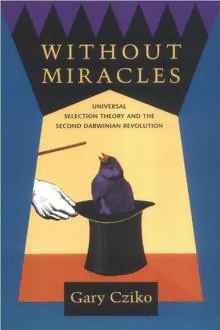
Without miracles: universal selection theory and the second Darwinian revolution PDF
346 Pages·1995·74.427 MB·English
Most books are stored in the elastic cloud where traffic is expensive. For this reason, we have a limit on daily download.
Preview Without miracles: universal selection theory and the second Darwinian revolution
Description:
"The fish's streamlined shape reveals functional knowledge ofthe physical properties of water.... The deadly effectiveness of the cobra's venom shows useful knowledge of the physiology of its prey.... Indeed, knowledge itself may be broadly conceived as the fit of some aspect of an organism to some aspect of its environment,whether it be the fit of the butterfly's long siphon of a mouth to theflowers from which it feeds or the fit of the astrophysicist's theories to the structure of the universe.... But how did such remarkable instances of fit arise? How did the animate world obtain its impressive knowledge of its surroundings? And how do organismscontinue to acquire knowledge and thereby increase their fit during their lifetimes?"In this sweeping account of the emergence of fit, Gary Cziko integrates numerous scientific disciplines within the perspective of a universal selection theory that attempts to account for all cases of fit involving living organisms, including those that might appear miraculous. Cziko's bold assertion is that all novel forms of adapted complexity—whether single-celled organisms or scientific theories—emerge from an evolutionary process involving cumulative blind variation and selection.Without Miracles describes many remarkable examples of the fit of various structures, behaviors, and products of living organisms to their environments in a broad synthesis of humankind's attempt to understand the emergence of complex, adapted entities. These explanations range from the providential accounts of the early philosophers and "natural theologians," through instructionist theories of the type proposed by Lamarck, to an ongoing "second Darwinian revolution" in which natural and artificial selection are being applied to many fields of science to both explain the emergence of naturally occurring adapted complexity and to facilitate the design of useful products ranging from microbes to computer programs.The evolution of explanations of fit from providential through instructionist to selectionist theories, Cziko argues, has occurred repeatedly in many different fields of knowledge along with a growing realization that the Darwinian mechanism of cumulative blind variation and selection is the only tenable nonmiraculous explanation for the emergence of any kind of functional complexity.Cziko applies this provocative selectionist thesis to a stunning range of domains including biology, immunology, neuroscience, ethology, psychology, anthropology, philosophy, education, linguistics, and computer science. The result is an up-to-date, clearly summarized collection of selectionist arguments that shows how our knowledge of the emergence of fit has itself evolved and continues to do so.
See more
The list of books you might like
Most books are stored in the elastic cloud where traffic is expensive. For this reason, we have a limit on daily download.
